- HOME
- Protecting Half-Earth: Opportunities and Obstacles
PROTECTING HALF-EARTH: OPPORTUNITIES AND OBSTACLES
Monday, April 17th, 2023, 7-8:30pm ET
CLICK HERE FOR TRANSCRIPT OF FORUM
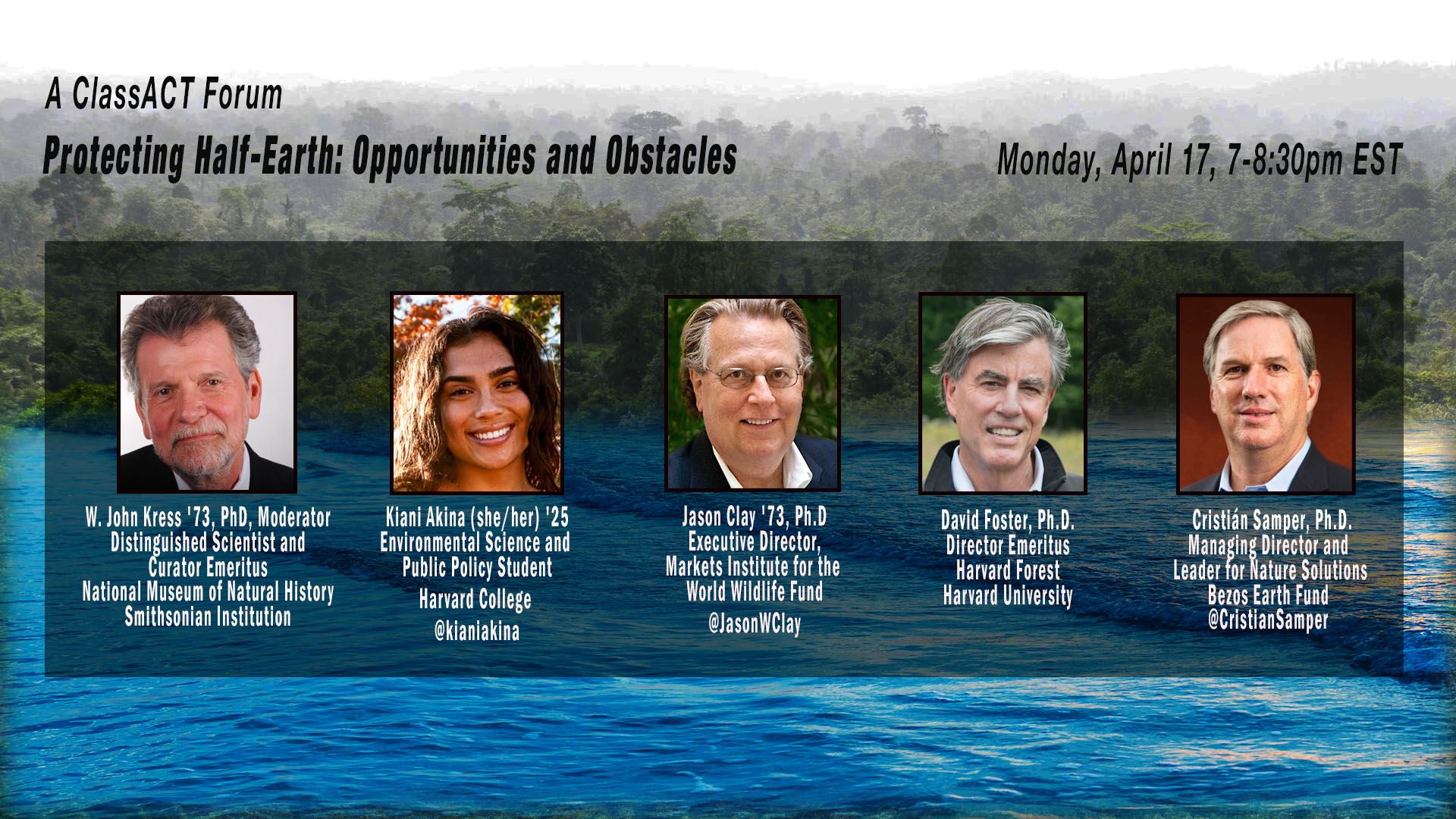
In his 2016 book Half-Earth: Our Planet's Fight for Life, Harvard biologist Edward O. Wilson (1929-2021) proposed the designation of half of Earth’s surface, both terrestrial and marine, as a natural reserve to safeguard the remaining biodiversity of the planet, including ourselves. Today about one-sixth of land and one-twelfth of marine areas receive (on paper) protection of the kind Wilson envisioned. Tough economic, social, political, and psychological forces work to impede any further expansion of protection.
During ClassACT HR73's initial forum called "Half Earth: Conserving Biodiversity from the Deep Sea to Mt. Everest" held in October of 2022, panelists discussed from a variety of scientific, geographical, disciplinary, professional, and ethical viewpoints the merits and feasibility of protecting the planet. Since that first forum, the UN Convention on Biological Diversity has now set as a priority protection of 30% of the planet by the year 2030, and many governments and states are adamantly calling for Wilson's 50% trajectory. How either of these goals will be achieved is not clear.
The second, follow-up ClassACT HR73 Forum again brought together a variety of expertise and perspectives to address how Half-Earth will unfold in the future, focusing on the challenges of conserving the planet. Assuming that 50% protection is imperative, panelists addressed questions such as: What are the drivers of environmental change? How do we define a protected landscape? What are the pathways to achieve this goal in order to overcome local, subnational, and global hurdles? How do we harness the forces at work in the world today to achieve Half-Earth? What do we do with the 50% of the planet that will not be protected? Answers to these topics are at the core to realizing Half-Earth.
All panelists are well-versed, highly experienced, and greatly motivated to solve the pressing environmental issues facing all of us in today's world. From major conservation NGOs and foundations to biodiversity research institutes and environmental science programs, all panelists have a direct connection to Harvard either as faculty, students, or alumni.
The panel of experts include Kiani Akina, Class of 2025 and an Environmental Science and Public Policy Major at Harvard College; Jason Clay ‘73, Ph.D., Senior Vice President, Markets and Food, and Executive Director, Markets Institute for the World Wildlife Fund; David Foster, Ph.D., Director Emeritus, Harvard Forest, Harvard University; and Cristián Samper, PhD., Managing Director and Leader for Nature Solutions at the Bezos Earth Fund. W. John Kress ’73, Ph.D., Distinguished Scientist and Curator Emeritus, National Museum of Natural History, Smithsonian Institution, who moderated the first ClassACT HR73 “Half-Earth” panel last fall, lead the discussion of the second panel on April 17 as well.
CLICK HERE FOR LIST OF RESOURCES
We have created 20 videos from this conversation—one of the whole event, and 19 others, divided by question, starting with what we can do as citizens. They are all available by clicking on the playlist in the YouTube video screen below. The playlist is very hard to see! You will find it along the top of the screen just to the right of the title of the forum. It looks like this ≡.
Click on the ≡ button. That will open a drop down menu. You can then scroll down the menu and choose individual videos to play.
OUR MODERATOR AND PANELISTS
MODERATOR W. JOHN KRESS '73, Ph.D.
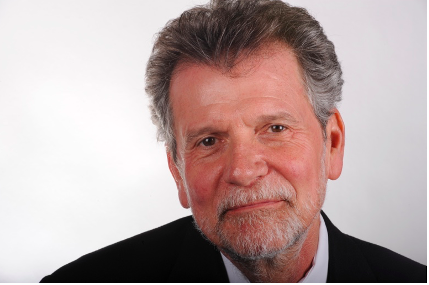 Dr. W. John Kress is Distinguished Scientist and Curator Emeritus at the Smithsonian’s National Museum of Natural History. He was Curator of Botany for over thirty years and formerly served as the Interim Under Secretary for Science at the Smithsonian and Director of Science in the Grand Challenges Consortia at the institution. He is currently Co-Chair of the Earth BioGenome Project, an international effort to generate complete genomes for all species of plants, animals, and fungi on the planet. Dr. Kress received his education at Harvard University (B.A., 1973) and Duke University (Ph.D., 1981), where he studied tropical biology, ethnobotany, evolution, and ecology. His taxonomic work on the Zingiberales, a group of tropical plants that includes gingers, bananas, and heliconias, has taken him around the world collecting plants and discovering new species. Dr. Kress was instrumental in developing the genetic tool known as “DNA barcoding” for plants, which allows the accurate identification of plant species using a short, universal segment of DNA sequence. His current research is focused on biodiversity genomics, conservation, and the Anthropocene. Among his over 250 scientific and popular papers are his books Plant Conservation – A Natural History Approach, The Weeping Goldsmith, The Art of Plant Evolution, Botanica Magnifica, and The Ornaments of Life - Coevolution and Conservation in the Tropics. His most recent book is Living in the Anthropocene – Earth in the Age of Humans about climate change and society. Dr. Kress is currently writing The Smithsonian Guide to Trees of North America to be published by Yale University Press. He is a Fellow of the American Association for the Advancement of Science and received the Parker-Gentry Award for Biodiversity and Conservation from the Field Museum of Natural History and the Edward O. Wilson Biodiversity Technology Pioneer Award. As well as serving as Affiliate Faculty at George Mason University, he is Visiting Scholar at Dartmouth College and the Arnold Arboretum of Harvard University. He lives in Dorset, Vermont, with his wife Lindsay L. Clarkson, MD.
Dr. W. John Kress is Distinguished Scientist and Curator Emeritus at the Smithsonian’s National Museum of Natural History. He was Curator of Botany for over thirty years and formerly served as the Interim Under Secretary for Science at the Smithsonian and Director of Science in the Grand Challenges Consortia at the institution. He is currently Co-Chair of the Earth BioGenome Project, an international effort to generate complete genomes for all species of plants, animals, and fungi on the planet. Dr. Kress received his education at Harvard University (B.A., 1973) and Duke University (Ph.D., 1981), where he studied tropical biology, ethnobotany, evolution, and ecology. His taxonomic work on the Zingiberales, a group of tropical plants that includes gingers, bananas, and heliconias, has taken him around the world collecting plants and discovering new species. Dr. Kress was instrumental in developing the genetic tool known as “DNA barcoding” for plants, which allows the accurate identification of plant species using a short, universal segment of DNA sequence. His current research is focused on biodiversity genomics, conservation, and the Anthropocene. Among his over 250 scientific and popular papers are his books Plant Conservation – A Natural History Approach, The Weeping Goldsmith, The Art of Plant Evolution, Botanica Magnifica, and The Ornaments of Life - Coevolution and Conservation in the Tropics. His most recent book is Living in the Anthropocene – Earth in the Age of Humans about climate change and society. Dr. Kress is currently writing The Smithsonian Guide to Trees of North America to be published by Yale University Press. He is a Fellow of the American Association for the Advancement of Science and received the Parker-Gentry Award for Biodiversity and Conservation from the Field Museum of Natural History and the Edward O. Wilson Biodiversity Technology Pioneer Award. As well as serving as Affiliate Faculty at George Mason University, he is Visiting Scholar at Dartmouth College and the Arnold Arboretum of Harvard University. He lives in Dorset, Vermont, with his wife Lindsay L. Clarkson, MD.
CALLS TO ACTION
- Follow and participate in ClassACT HR73's two upcoming major environmental efforts:
- Strengthening and broadening land trusts locally and nationally
- Becoming part of the Biodiversity Treaty Ratification Action Group - this group is trying to orchestrate the ratification by the US of the International Convention on Biological Diversity.
- Email ClassACT HR73 assistant Kate Freed at kfreed@classacthr73.org to participate in either or both initiatives.
KIANI AKINA (SHE/HER) '25
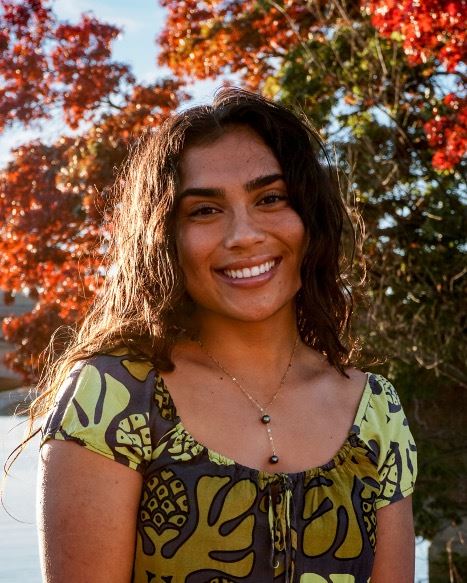 Kiani Ku’uleimomi Akina is a sophomore at Harvard College from Kahuku (O’ahu), Hawai’i. Kiani studies Environmental Science and Public Policy with a focus on the Pacific (islands) and indigeneity. In the summer of 2022, she worked for Kuleana Coral Restoration where they work to restore coral colonies on the outer Hawaiian reefs. Kiani introduced the practice of Hawaiian kilo, an indigenous practice of observation to better land and ocean stewardship, into their frameworks. After undergrad, Kiani hopes to attend Law school, and then return home to Hawai’i where she hopes to work with her communities to make better climate policy, incorporate indigenous knowledge into land management and restoration, and help Native Hawaiians get land back. Aside from academics, Kiani is a member of the Women’s Rugby Team, where she serves as her team's Diversity and Inclusion Chair. She is the President of the Hawai’i Club and a Diversity, Equity, and Inclusion co-chair of the newly formed Harvard Climate Coalition. Kiani enjoys dancing hula, making leis, spending time with her family, and learning more from her Hawaiian heritage.
Kiani Ku’uleimomi Akina is a sophomore at Harvard College from Kahuku (O’ahu), Hawai’i. Kiani studies Environmental Science and Public Policy with a focus on the Pacific (islands) and indigeneity. In the summer of 2022, she worked for Kuleana Coral Restoration where they work to restore coral colonies on the outer Hawaiian reefs. Kiani introduced the practice of Hawaiian kilo, an indigenous practice of observation to better land and ocean stewardship, into their frameworks. After undergrad, Kiani hopes to attend Law school, and then return home to Hawai’i where she hopes to work with her communities to make better climate policy, incorporate indigenous knowledge into land management and restoration, and help Native Hawaiians get land back. Aside from academics, Kiani is a member of the Women’s Rugby Team, where she serves as her team's Diversity and Inclusion Chair. She is the President of the Hawai’i Club and a Diversity, Equity, and Inclusion co-chair of the newly formed Harvard Climate Coalition. Kiani enjoys dancing hula, making leis, spending time with her family, and learning more from her Hawaiian heritage.
CALLS TO ACTION
- I invite you to think critically about kincentric ecology and ask yourself what you can do to carry this practice out in your life. As a starting point, I have gathered a list of supplemental readings to guide your thinking and research and would also recommend the books listed in the chat. Furthermore, I call on you to recognize the tribal nations and Indigenous lands you currently reside in and find ways to get involved and support the environmental work and activism they are already doing within your communities. Through the website, Native-Land.ca, you can see what land you currently reside on. Please remember that allyship is a verb, and we must continue working collectively to preserve biodiversity and landscapes.
- Follow and support the Harvard Climate Coalition, which is an umbrella organization that connects the Harvard environmental organizations on campus, and connects to the graduate schools and the larger Boston community.
- Encourage Harvard University, as alumni, to get more classes focused on environmental conversations, particularly from the Indigenous perspective.
JASON CLAY '73, Ph.D.
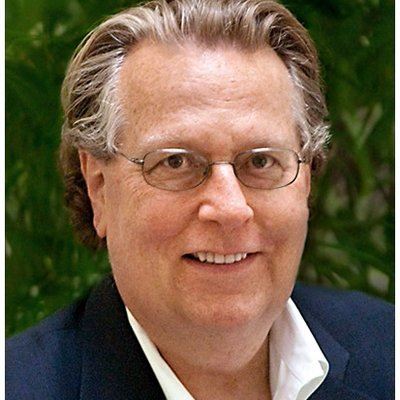
Jason Clay, SVP, Markets, WWF-US provides thought leadership on global issues and trends affecting food and the environment. He ran a family farm, worked at USDA, taught at Harvard and Yale, and spent 15 years working with indigenous and displaced people. In 1988, he worked with companies like Ben & Jerry’s (Rainforest Crunch) to use products to generate funding for human rights and environment issues. Clay launched WWF’s global programs on aquaculture, agriculture, livestock, and market transformation and supply chains. He led a 3-year program to identify and reduce the key impacts of global shrimp aquaculture. He co-convened standards setting processes for the production of some two dozen commodities, worked with 70 of the 100 largest global food companies, authored 20 books and 700 articles, and given 1,000 invited talks. Clay is currently exploring new business models and markets to address producer livelihood and assets while reducing key impacts from producing food globally. He is currently leading a 2-year proof of concept with the Global Environment Facility, UN FAO and World Bank to explore Codex Planetarius, a set of minimum global environmental standards that reduce the key impacts of producing globally traded food. Clay studied at Harvard, LSE and received his PhD in anthropology and international ag from Cornell.
CALL TO ACTION
- Help restore habitat and biodiversity in areas of use, either by supporting efforts financially or taking part in them, doing it yourself, or by voting on these issues.
DAVID FOSTER, Ph.D.
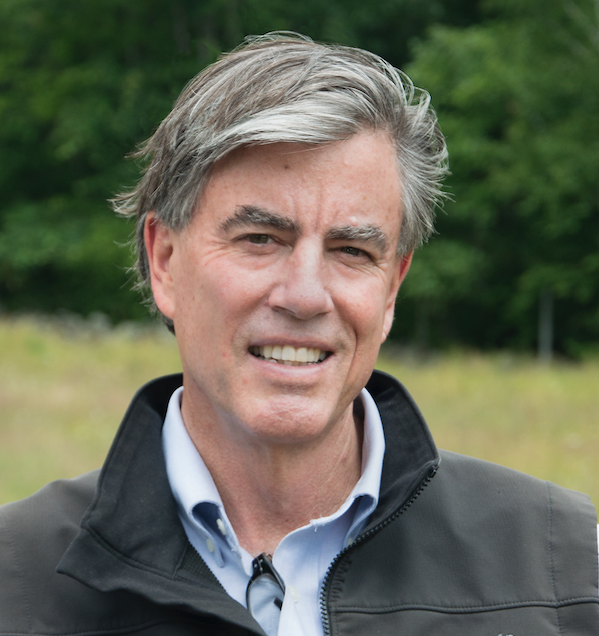 David Foster is an ecologist, senior conservationist and director emeritus at the Harvard Forest, Harvard University's 4000-acre ecological laboratory, and president emeritus of the Highstead Foundation, which advances landscape to regional conservation in New England. David’s research focuses on interpreting landscape dynamics from climate change and other natural and human processes and applying these insights to conservation and management. In 2010, David and colleagues developed Wildlands and Woodlands – A Vision for the New England Landscape that argues for regional forest and farmland conservation integrated with resilient community development for the benefit of nature and all people. The Wildlands and Woodlands initiative is advancing through strong collaboration with Food Solutions New England, which developed the companion New England Food Vision, the network of regional conservation partnerships, and many public and private partners. David is the author of Thoreau’s Country. Journey Through a Transformed Landscape (2001), Hemlock: A Forest Giant on the Edge (2014) and A Meeting of Land and Sea: Nature and the Future of Martha's Vineyard (2017). David’s current project is a comprehensive study: Wildlands in New England. Past Present and Future.
David Foster is an ecologist, senior conservationist and director emeritus at the Harvard Forest, Harvard University's 4000-acre ecological laboratory, and president emeritus of the Highstead Foundation, which advances landscape to regional conservation in New England. David’s research focuses on interpreting landscape dynamics from climate change and other natural and human processes and applying these insights to conservation and management. In 2010, David and colleagues developed Wildlands and Woodlands – A Vision for the New England Landscape that argues for regional forest and farmland conservation integrated with resilient community development for the benefit of nature and all people. The Wildlands and Woodlands initiative is advancing through strong collaboration with Food Solutions New England, which developed the companion New England Food Vision, the network of regional conservation partnerships, and many public and private partners. David is the author of Thoreau’s Country. Journey Through a Transformed Landscape (2001), Hemlock: A Forest Giant on the Edge (2014) and A Meeting of Land and Sea: Nature and the Future of Martha's Vineyard (2017). David’s current project is a comprehensive study: Wildlands in New England. Past Present and Future.
CALL TO ACTION
- Look to academic institutions, which are currently misaligned in their exclusive focus on greenhouse gases, emissions, and sustainability without these issues' corresponding connection to the land. There is little focus within sustainability initiatives in academia for treating land well, or for helping the different sectors of academia (institutional leaders, faculty, students, alums) mobilize in ways that address land based issues. There is so much that can be done to use Harvard University's resources, for example, to make sure we are doing the right thing by Nature.
CRISTIÁN SAMPER, Ph.D.
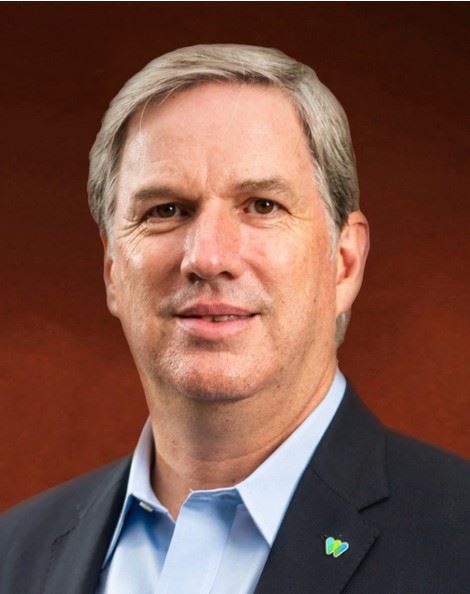 Cristián Samper is the Managing Director and Leader of Nature Solutions at the Bezos Earth Fund and has served as President & Chief Executive Officer of the Wildlife Conservation Society (WCS) since 2012. WCS is one the largest environmental non-profit organizations in the world, established in 1895 to save wildlife and wild places. WCS manages the largest network of urban wildlife parks, hosting four million visitors each year, and carries long-term field research and conservation programs in more than 60 countries.
Cristián Samper is the Managing Director and Leader of Nature Solutions at the Bezos Earth Fund and has served as President & Chief Executive Officer of the Wildlife Conservation Society (WCS) since 2012. WCS is one the largest environmental non-profit organizations in the world, established in 1895 to save wildlife and wild places. WCS manages the largest network of urban wildlife parks, hosting four million visitors each year, and carries long-term field research and conservation programs in more than 60 countries.
Prior to joining WCS, Dr. Samper served as Director of the Smithsonian’s National Museum of Natural History and was the founding director of Colombia’s Alexander von Humboldt Institute. He served as Chair of the science advisory body of the UN Convention on Biological Diversity and was one of the leaders of the Millennium Ecosystem Assessment. He is a member of the Council on Foreign Relations and a Fellow of the American Academy of Arts and Sciences.
Raised in Colombia, Dr. Samper studied biology at the Universidad de Los Andes and earned his MA and PhD from Harvard University.
CALLS TO ACTION
- Vote for the right people who will bring about the environmental changes we want.
- Look to universities to train the next generation of environmentalists. Every single area of Harvard University needs to train people who embrace environmental policies.
- Pick three things you can to to help the environment, and share them with 3 other people.


